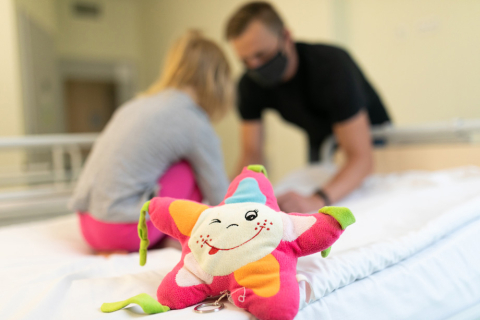The presence of parents on the wards was not always fully possible. In the 1980s, caregivers of children were allowed to visit their children who were in medical facilities only 3 times a week - on Tuesdays, Thursdays and Sundays. And it could only be done by one person at a time. In the 1990s, there was a huge revolution in the approach to parental presence in hospitals - from daily visits from 3 p.m. to 7 p.m. to being able to stay with a sick child 24 hours a day. - The change in the approach to the presence of the closest ones in hospital was, on the one hand, a response to the caregivers' expectations, but, above all, it resulted from the desire to improve children's psychology and make it easier for them not only to undergo the procedures but also to accept the necessity of hospital treatment - emphasizes Professor Michał Matysiak, Head of the Chair and Department of Pediatric Oncology, Hematology and Transplantology at the UCC MUW. The professor emphasizes that children tolerate all necessary medical procedures much better in the presence of their caregivers than without them. However, a parent's stay in the hospital throughout their child's treatment poses great challenges - not only for the medical staff, but especially for the caregivers themselves, and depends on their emotional maturity and understanding that they are there to support the hospitalized child, not to heighten their fears.
Attachment parenting in the hospital
According to Wanke-Rytt, MD, PhD, the importance of the parent's presence in the hospital reality cannot be overstated. The touch has an anti-stress effect and makes a hospitalized child calmer. Studies show that when a baby is touched and close to a parent, the baby's brain releases growth hormones and endorphins - chemicals that reduce stress levels. A calmer child is easily treated, and a more easily treated child goes home faster. Stress delays healing, prolongs the healing process and is harmful to the child's central nervous system. - By hugging and carrying children, we are investing in their entire lives. This is the most precious and the most lasting gift - believes Wanke-Rytt, MD, PhD. Hence the postulate to promote in hospitals the attachment parenting and to encourage parents to spend with their children as much time as they need.
The therapeutic importance of the presence of a parent in the hospital with a sick child was discussed by experts from the Medical University of Warsaw during the international conference "For the family to be together - the role of family closeness during a child's hospital stay" organized by the Ronald McDonald Foundation. The event was co-hosted by Professor Zbigniew Gaciong, Rector of our University.
For nearly 50 years, RMHC, a global nonprofit organization of which the Ronald McDonald Foundation is a part, has focused on child-centered and family-centered care for the child requiring hospitalization for treatment. The conference "For the family to be together - the role of family closeness during a child's stay in hospital" was organized on the occasion of the twentieth anniversary of the Foundation. The date of the event was chosen not by coincidence - the Day of the Child established by the United Nations General Assembly, which in Poland falls on June 1.
The Medical University of Warsaw has been cooperating with the Ronald McDonald Foundation for years in order to improve the standards of pediatric medicine. Every day, the Foundation's team is present at the wards of the Children's Clinical Hospital UCC MUW, helping hospitalized children and their families in their fight against the disease. In 2021, on the Banach Campus, next to the hospital building, the Ronald McDonald House was opened - a friendly space that can be used by parents of the facility's patients.
